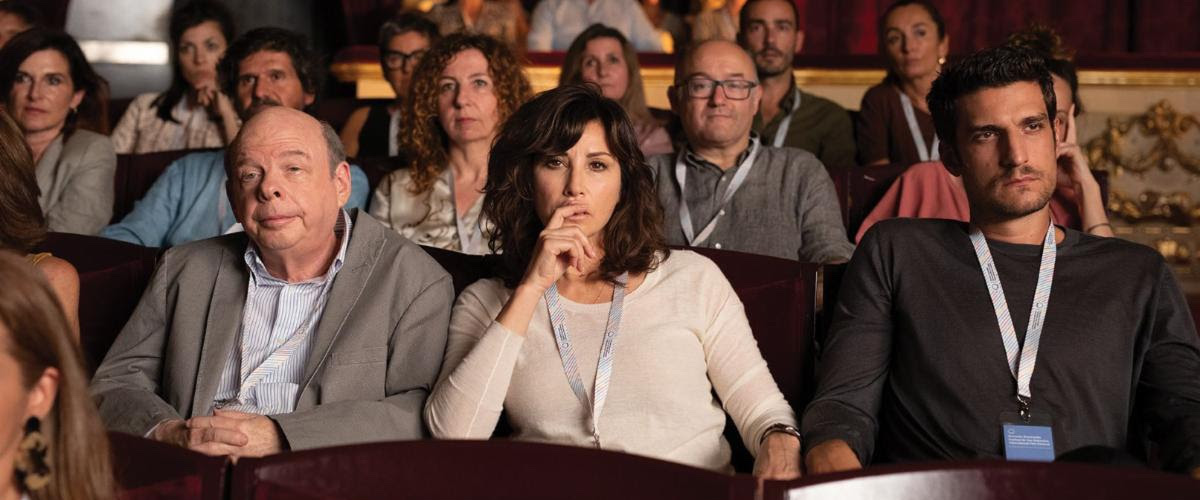When I got the e-mail asking me to review this movie, a song started going through my head, and that song was Pet Shop Boys’ “What Have I Done To Deserve This?”
I don’t want to make too big a deal of this here—or belabor the obvious, for that matter—but to deal with a Woody Allen picture these days is a nettlesome task. Some say that there are no authors, only works. Others swear that there are no works, only authors. But given that Allen as a filmmaker has frequently been the star of his own pictures, and that he constructed over the years a comic persona that became practically archetypal, neither tack really gives the nettled observer much of an out.
Still. Relative to the scandals attached to his name, some still willing to contend with the films have pointed out that, for instance, 2013’s “Blue Jasmine” and 2017’s “Wonder Wheel” could be interpreted as spiteful rejoinders to Allen’s ex-partner Mia Farrow. I found “Blue Jasmine” intermittently effective and “Wonder Wheel” absolutely abominable, but in neither case did my assessment really have anything to do with their possible real-life subtexts. It was just that “Blue Jasmine” had some reasonably sharp writing and a well-modulated performance by Cate Blanchett and “Wonder Wheel” was atrociously written and Kate Winslet wasn’t too well served by her director. My point is that I’ve been inclined to look at these things from a relatively detached point of view. Is that good or bad?
I don’t know, but I do know I don’t have an infinite word count.
So. “Rifkin’s Festival,” which Allen completed in 2020 and is just now getting a U.S. release, stars Wallace Shawn as Mort Rifkin, a film critic and academic suffering from, you’ll never guess, a late-life crisis. Accompanying his publicist wife Sue (Gina Gershon, who is only 19 years Shawn’s junior) to the San Sebastian Film Festival, he’s beset by chest pains and insecurities. He doesn’t care for Philippe (Louis Garrel, who is only 21 years Gershon’s junior), the pretentious and ultry-sultry director Sue is repping. Sue likes Philippe’s new anti-war film because it’s politically conscious and relevant.
Pshaw, Mort responds. “We could have an ideal world politically and we’d still have these terrifying questions,” he rants. Questions about what, you ask? Well about “God, death, the meaning of life.”
You might be familiar with the Internet phrase “back on my bullshit.” In Allen’s case it’s more like still on it. A good number of great artists spent their lives on bodies of work in which they said more or less the same thing, over and over. Allen’s problem, for a long time, has been that, while the statements are more or less the same, their delivery, and hence their impact, gets weaker over time.
And so we see Mort’s self-centered and self-defeating jealousy (when in fact Sue treats him with courtesy throughout), which gets put on the back burner when he, yes, finds intrigue in another younger woman, this one a doctor whom he consults on account of some hypochondriacal complaints. (She’s appealingly played by Elena Anaya.) All the while Mort dreams about his fears and anxieties—and he dreams them as scenes from classic films.
This is a fun conceit, and such conceits, which one also finds in abundance in Allen’s pieces of prose humor, can make for better-than-decent pictures. “Midnight In Paris,” for instance, which garnered substantial critical praise and became a genuine box office hit. That was a little over ten years ago, but doesn’t it seem like forever now? “Rifkin’s Festival” does not hit the highs of “Midnight in Paris,” but its pastiches work pretty well at first. The “Rosebud” joke in the “Citizen Kane” parody got me good. In the bit inspired by Fellini’s “8 ½” the question “Who but a Jew would think of suing God” inspires Mort to a response that gave me the first belly laugh I’ve had with an Allen film in some time. By the time we get to “The Exterminating Angel,” though, Allen’s run out of steam, and seems more inspired by his own “Stardust Memories” than by the Buñuel film.
Wallace Shawn has appeared in a few Allen films since making his screen debut in 1979’s “Manhattan” (as a walking punchline of sorts), but not as many as you might think. In any event, for whatever it’s worth nowadays, he’s an ideal Allen surrogate, because he’s got his own well-established persona which is close enough to Allen’s over-educated schlub schtick but genuinely distinct from it. He’s fun to watch here. As is the rest of the cast. While a very substantial contingent of actors in the U.S. have stated they won’t work with Allen, he manages to make do.
And Allen’s direction, with Vittorio Storaro lensing, is typically fluid. If you’re at all inclined to view this movie, you’ll find it’s very easy to take in. The colors are wonderful—no dun-hued “realism” here, just sunny skies and honey-colored-light pouring through windows, except in the black and white sections. Allen actually pulls off a credible Kubrickean/Andersonian long take in a scene in the doctor’s office. This doesn’t quite compensate for the usual writing infelicities, as when Mort expresses his enthusiasm for the Holy Trinity of the Nouvelle Vague, Godard, Truffaut, and … Claude Lelouch? Lelouch’s name turns out to be there to set up a dream based on “A Man And A Woman.” But a film critic who would make an aesthetic troika out of those three is not dreamt of in my philosophy.
Now playing in theaters and available on digital platforms.




















